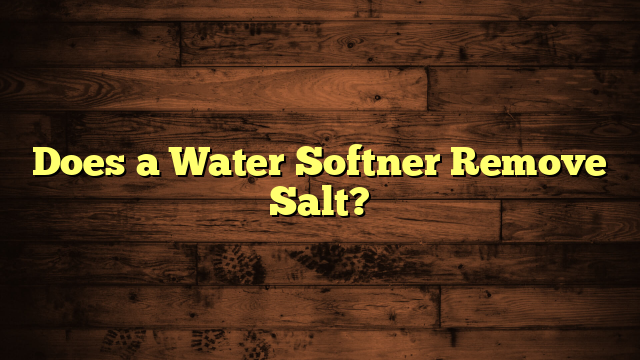Does a Water Softner Remove Salt?
You might think a water softener is some magical device that banishes all salt from your water, but that's far from the truth. Instead of removing salt, it actually introduces more sodium into the mix while replacing hard minerals. If you're curious about how this process works and what it means for your health or your appliances, you'll want to understand the nuances involved. The implications of softened water on your sodium intake could surprise you.
Key Takeaways
- Water softeners do not remove salt; they primarily remove hard minerals like calcium and magnesium from water.
- The ion exchange process in water softeners replaces hard minerals with sodium ions, increasing sodium levels in softened water.
- Softened water typically contains sodium concentrations ranging from 20 to 100 mg/L due to the ion exchange process.
- Regular salt addition is necessary for the regeneration of resin beads, ensuring the water softener's continued operation.
- Alternatives to traditional water softeners, like reverse osmosis, can effectively remove both hard minerals and sodium from water.
Understanding Water Softeners
When it comes to understanding water softeners, it's vital to break down how they work. Water hardness primarily comes from minerals like calcium and magnesium, which can cause buildup in pipes and appliances. That's where water softeners come in; they're designed to remove these hard minerals through a process called ion exchange.
In this process, the softener contains resin beads that are charged with sodium ions. When hard water flows through the system, the calcium and magnesium ions attach to the resin beads. In exchange, sodium ions are released into the water. This swap effectively reduces water hardness, making your water softer and more manageable for daily use.
You'll notice the benefits in various areas of your life, from cleaner dishes to softer skin after a shower. Understanding this ion exchange process demystifies how water softeners operate and why they're essential for maintaining your home's plumbing and appliances.
The Role of Salt
Salt plays an essential role in the functioning of water softeners. It's the key ingredient that helps remove hard minerals like calcium and magnesium from your water supply, making it softer and more enjoyable for everyday use.
When you think about salt types, you'll find options like rock salt, solar salt, and evaporated salt, each with its unique benefits and efficiency levels. Choosing the right salt source can greatly impact your water softening process.
Using the right salt source isn't just about effectiveness; it also affects how often you need to refill the salt in your water softener.
For instance, solar salt is often more affordable and dissolves well, while evaporated salt is more refined and purer, leading to fewer impurities in your system.
How Water Softening Works
Water softening involves a straightforward yet effective process that primarily targets hard minerals in your water supply. The two main hardness minerals, calcium and magnesium, can cause various issues, from soap scum buildup to reduced appliance lifespan.
To tackle this problem, water softeners use a method called ion exchange. In this process, your water flows through a tank filled with resin beads coated with sodium ions. As hard water passes over these beads, the calcium and magnesium ions in the water are attracted to the resin, while the sodium ions are released into the water.
This exchange effectively reduces the hardness of your water, improving its overall quality and performance. Understanding water chemistry is essential here, as it helps you grasp how hardness minerals interact with your household appliances and plumbing.
Salt in the Softening Process
In the water softening process, salt plays an essential role as it replenishes the sodium ions used during ion exchange. This is vital for the softener functionality, as it helps remove hard minerals such as calcium and magnesium from your water. Different salt types can be utilized, each affecting the softening system's efficiency in its unique way.
Here's a quick overview of the common salt types used in water softening:
| Salt Type | Composition | Benefits |
|---|---|---|
| Sodium Chloride | NaCl | Most common, affordable |
| Potassium Chloride | KCl | Gentle on plants, less sodium |
| Solar Salt | Evaporated Sea Salt | High purity, dissolves easily |
When you add salt to your softener, it regenerates the resin beads in the unit, allowing them to continue removing hardness from your water. Remember, choosing the right salt type can impact your system's performance, so consider what works best for your needs. Understanding these factors helps you maintain your water softener effectively, ensuring you enjoy the benefits of soft water daily.
Does Softened Water Contain Salt?
Softened water does contain some sodium, which is a byproduct of the ion exchange process used in water softeners. When hard water passes through a softener, calcium and magnesium ions are exchanged for sodium ions. This means that while the hard minerals are removed, sodium replaces them, resulting in softened water that has a higher salt content than untreated water.
You might wonder how much sodium is actually in softened water. Generally, the concentration isn't excessively high, and it typically ranges from 20 to 100 milligrams per liter. To put that into perspective, that's far less than the amount of sodium found in many processed foods.
If you're monitoring your sodium intake for health reasons, it's wise to take into account this salt content. You can also explore alternative water treatments, like reverse osmosis systems, that can provide soft water without the added sodium.
Understanding the sodium levels in softened water helps you make informed decisions for your household. Ultimately, while softened water does contain some sodium, the actual amount mightn't be as concerning as you think, especially compared to the sodium found in food and beverages.
Benefits of Using a Water Softener
Using a water softener can markedly boost the longevity of your appliances, saving you money on replacements down the line.
You'll also notice softer skin and hair, as the minerals in hard water can often lead to dryness and irritation.
With these benefits, investing in a water softener can truly enhance your daily life.
Improved Appliance Longevity
Many homeowners overlook the impact of hard water on their appliances, but it can greatly shorten their lifespan. When hard water flows through your washing machine, dishwasher, and water heater, it leaves behind mineral deposits. Over time, these deposits can lead to clogs, inefficiencies, and even breakdowns. By installing a water softener, you can greatly improve appliance maintenance and extend the life of your household devices.
With softened water, you'll notice reduced repairs, as appliances run more efficiently without the buildup of harmful minerals. This not only saves you money on repair costs but also reduces the frequency of replacing appliances altogether. You'll find that your water heater heats more effectively, your dishwasher cleans better, and your laundry comes out fresher.
Incorporating a water softener into your home isn't just about convenience; it's an investment in your appliances' longevity. By keeping them in better working condition, you can enjoy peace of mind and the satisfaction of knowing you're taking proactive steps to protect your home.
In the long run, a water softener can pay for itself through savings on maintenance and repairs.
Softer Skin and Hair
One of the standout benefits of a water softener is its positive impact on your skin and hair. When you switch to softened water, you may notice significant improvements in skin hydration. Hard water contains minerals that can strip your skin of its natural oils, leading to dryness and irritation.
With softened water, you enjoy moisturizing benefits that help keep your skin smooth and supple.
Your hair also reaps the rewards of softened water. It can feel softer and more manageable, free from the harsh effects of mineral buildup. You might find that your shampoo lathers better and rinses out more easily, resulting in cleaner hair without residue.
This means fewer bad hair days and more days with that silky, shiny finish you love.
Moreover, by improving overall skin hydration, softened water can help reduce the occurrence of conditions like eczema and psoriasis.
Common Misconceptions About Salt
A surprising number of people believe that water softeners actually remove salt from water, leading to confusion about their true function.
In reality, water softeners use a process called ion exchange, which replaces hard minerals like calcium and magnesium with sodium ions. This means that while the water becomes softer, it doesn't actually remove salt; instead, it adds a bit more sodium to your water.
Many salt consumption myths contribute to misunderstandings about how salt affects health. For instance, some folks think that all salt is bad for you, ignoring the fact that our bodies need a certain amount for essential functions.
While excessive salt intake can lead to health issues like hypertension, moderate consumption is generally safe for most people.
It's essential to understand the salt health effects in your diet. If you're concerned about sodium levels, consider your overall dietary habits rather than focusing solely on water softening systems.
Alternatives to Water Softeners
If you're looking for ways to soften water without using traditional water softeners, several alternatives can fit your needs.
These methods can effectively reduce hardness in your water without the drawbacks of salt-based systems. Here are three options to evaluate:
– Reverse Osmosis Systems: These systems filter water through a semi-permeable membrane, removing minerals and contaminants, resulting in softer water.
They're great for drinking water and can enhance the taste.
– Magnetic Water Conditioners: These devices use magnets to alter the physical properties of minerals in water.
This change can help prevent scale buildup in pipes and appliances, making your water feel softer.
– Descaling Agents: These chemical solutions can be added to your water supply to dissolve calcium and magnesium deposits.
While not as common, they can be effective in certain situations.
Choosing the right alternative depends on your specific needs and preferences.
Remember, while these options can soften water, each has unique benefits and limitations.
It's wise to research and consult with a professional to determine which solution is best for you.
Frequently Asked Questions
Can Using a Water Softener Cause Salt Buildup in Plumbing?
Using a water softener can lead to salt buildup in your plumbing if not maintained properly. Regular plumbing maintenance helps prevent this issue, ensuring your system runs efficiently without the risks associated with excessive salt accumulation.
How Often Should I Refill the Salt in My Water Softener?
Refilling salt in your water softener's like watering a plant—do it regularly! Generally, check every 4-6 weeks for salt refill frequency, ensuring ideal water softener maintenance and preventing issues down the line.
Is Softened Water Safe for Drinking and Cooking?
Yes, softened water's generally safe for drinking and cooking. However, if you're concerned about drinking safety, consider testing your water. It can affect cooking quality, especially for certain recipes that require precise mineral content.
What Happens if I Run Out of Salt in My Water Softener?
When you run out of salt, your water softener's efficiency drops considerably, leaving hard water minerals untreated. In fact, about 85% of households benefit from soft water—regular salt replenishment guarantees you stay among them.
Does a Water Softener Affect Water Pressure in My Home?
A water softener can affect water pressure in your home. If it's not properly maintained, mineral buildup might restrict flow. Regularly check and clean your system to guarantee your home appliances function effectively without pressure issues.
Conclusion
In conclusion, a water softener doesn't remove salt; it actually adds sodium ions into your water. Think of it like swapping out a classic car's engine for a shiny new one—it's still a car, just with different parts. While softened water can be beneficial for your plumbing and skin, it does come with increased sodium levels. If you're watching your sodium intake, keep this in mind when sipping that glass of water!







